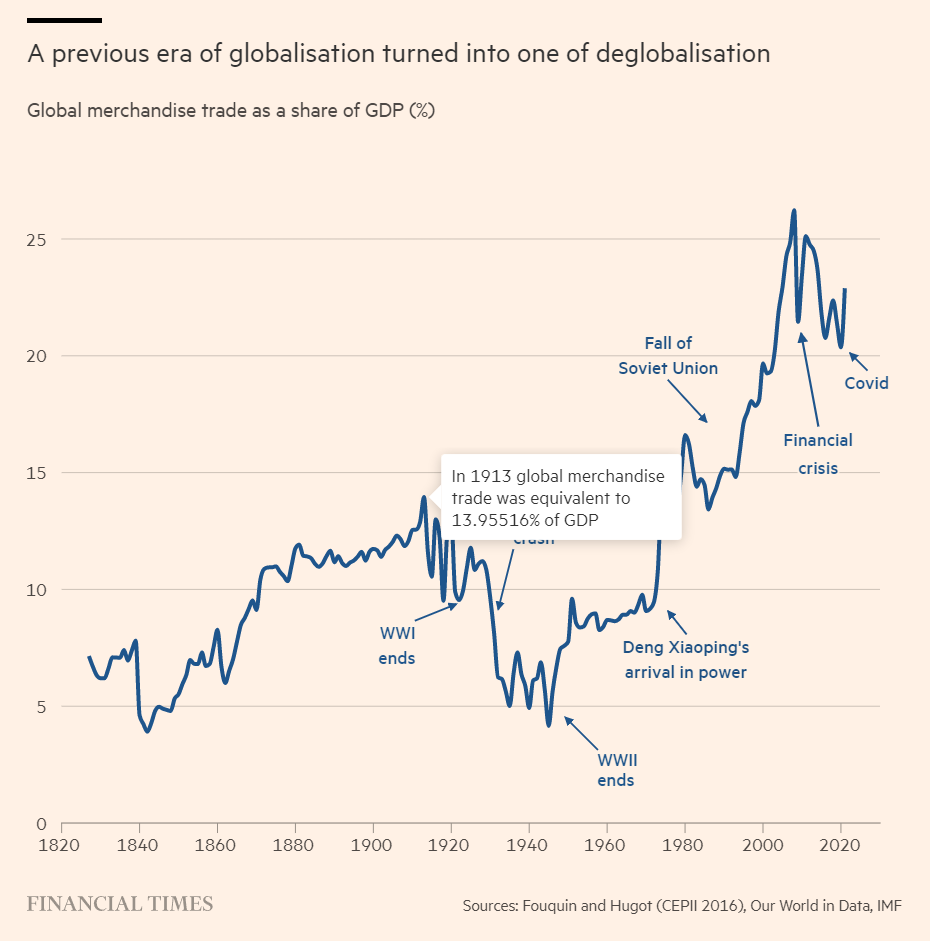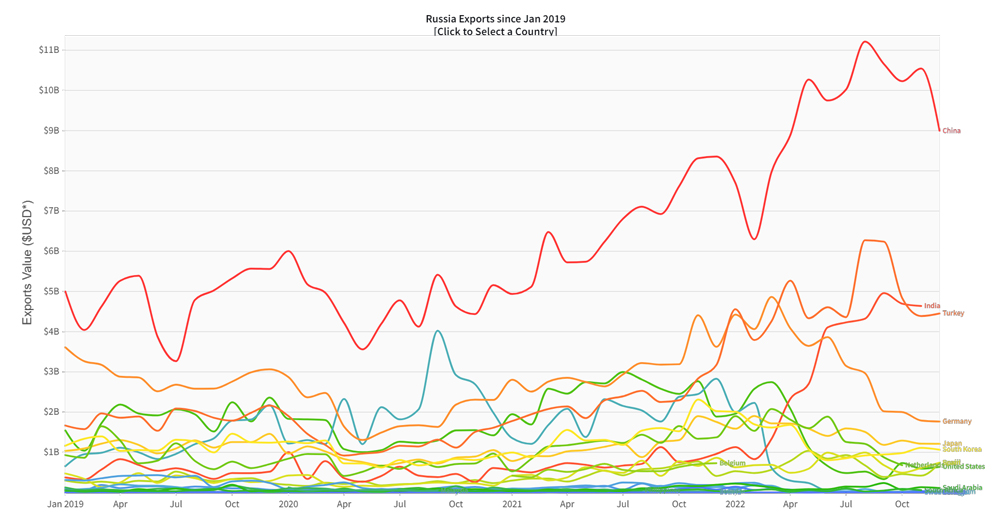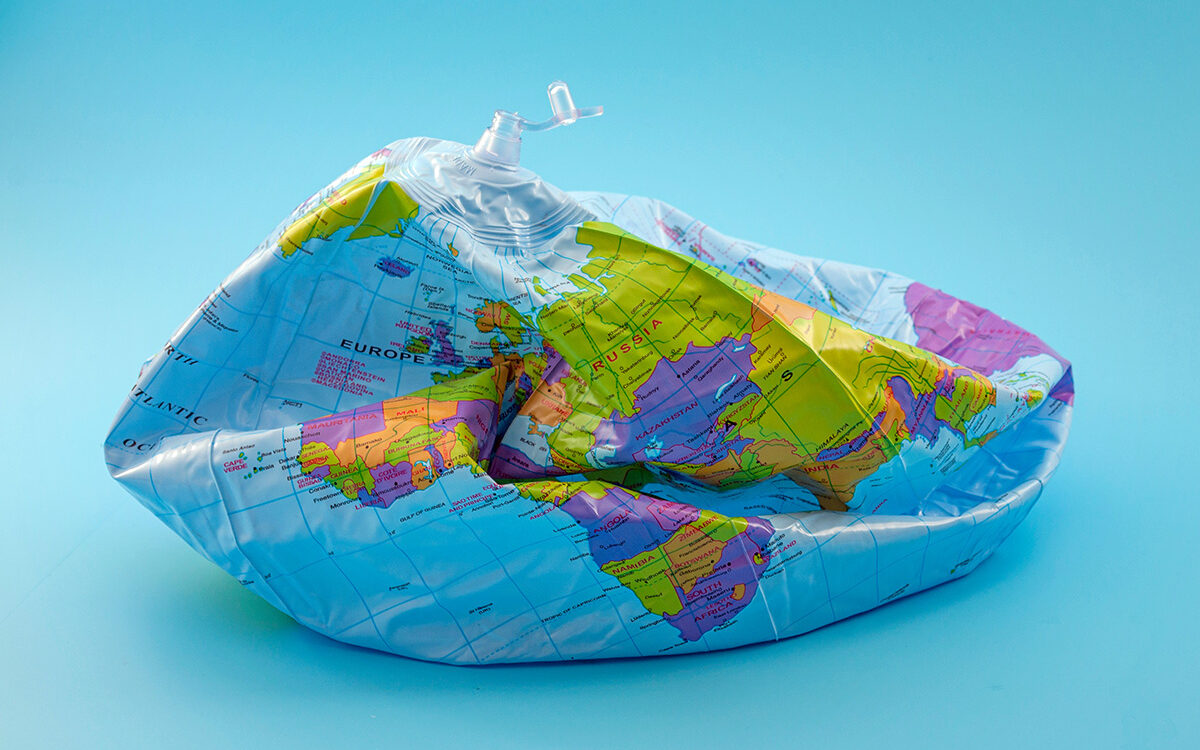Thirty years ago, the end of communism held out hope that Montesquieu’s ‘doux commerce’ would help bring peace to the world. The General Agreement on Tariffs and Trade (GATT) transitioned into the World Trade Organisation (WTO), with China joining in 2001 and Russia in 2012. Unfortunately, as Martin Wolf sums up in the Financial Times, trade does not necessarily secure peace: “The causality goes rather in the opposite direction, from peace to commerce.”
Today, geopolitics once again has the upper hand and is even giving rise to fears of ‘deglobalisation’. “It is conflicts over power that most threaten globalisation,” adds the Financial Times’s chief economics commentator, among others.
We are not headed towards a benign localism, but towards negative-sum rivalry. Our world may not survive a virulent bout of that disease.
Martin Wolf (FT)
Several factors have conspired to cause this reversal. The global economic and financial crisis of 2008-2009 brought to a halt a period of ‘hyper-globalisation’ in trading capital and goods and services. Trade openness ratios (trade-to-GDP-ratios) began to fall, signalling that world trade had begun to grow less quickly than wealth. China’s openness ratio fell back to the level at the end of the Cold War.
The geopolitical and ideological confrontation between China and the United States, conceptualised by political scientist Graham Allison as the “Thucydides Trap”, is perhaps the most important geopolitical factor behind political and sovereignty concerns overshadowing economic and trade concerns. The rise of China threatens the “hegemonic stability” wielded by the United States in the economic, financial and monetary sphere, which was the very foundation of hyper-globalisation.
A turning point long before the war in Ukraine
Long before the war in Ukraine, the situation with Huawei (banned by Western countries from deploying 5G under pressure from the United States), Washington’s challenge to the WTO’s supranational dispute settlement mechanism, the strengthening of controls on foreign investments, and the labelling of China as a “systemic rival” by the European Commission in 2019, marked a turning point in relationships with this country: They showed that trade, especially in sensitive technologies, is now increasingly viewed in terms of a balance between political costs and benefits.

Interdependencies persist on economic, health or environmental issues, as illustrated by the Covid-19 pandemic and the increasing effects of climate change, but they are also factors that encourage relocation and the shortening of production chains. It is noteworthy that in 2020, amid the pandemic, the European Union enshrined the concept of “open strategic autonomy” in economic matters, something that was not a foregone conclusion in Nordic and liberal countries. Joint industrial projects are taking shape, for example in the field of batteries, hydrogen and semiconductors.
The breaking point: Ukraine
Lastly, the war in Ukraine has pushed the growing rift between the liberal West and Putin’s Russia to the breaking point. The virtual embargo imposed on Russia has forcibly disconnected it from the Western economy. The West is seeing the negative economic consequences of these developments intensify, with rising inflation, especially in energy prices, falling purchasing power and growing concerns of a recession, and is plunged into a ‘war economy’. Russia, which touted the BRICS format (Brazil, Russia, India, China and South Africa) as early as 2009 as a counterweight to Western domination, is calculating that it will survive by diversifying its economic relations.

Beyond power rivalries, the international order is also weakened by the retreat of ‘liberal’ values (democracy, freedoms, rule of law, tolerance) in the face of the push of illiberal nationalism, not only in China and Russia but also in many developing countries and even in Western countries (cf. Orban, Trump, Brexit, Netanyahu, Bolsonaro…). Measured by the American NGO Freedom House, the number of ‘not free’ countries, which had been decreasing until the 2000s, has started to increase again (with, significantly, the passage of Turkey from ‘partly free’ to ‘not free’, and of India from ‘free’ to ‘partly free’). And history has shown that conflict can only undermine an international system without common values, torn apart by nationalism.
These developments weaken trust, cooperation, rules and multilateralism. The Western alliance system structured around the United States, successfully reinvigorated by the Biden Administration, still constitutes a dominant area of stability, but one that is increasingly confronted with rising geopolitical risks, as evidenced by the war with Russia, the fragility of Africa and the Middle East, and tensions in the Asia-Pacific.
What will the world look like in the future?
There are fears of a return to a Cold War between the liberal West and the powers that challenge it. Multilateralism threatens to fracture between Western institutions (such as the OECD, NATO and the G7) and universal institutions (UN and G20). Security and sovereignty defence policies are on the rise and arms spending is on an upward cycle everywhere. In the face of this spiral of conflict, only nuclear weapons pose a limit to war, as was the case during the Cold War and as the conflict in Ukraine reminds us once again.
Without abandoning the fight for values, it is perhaps time to rediscover that global stability also depends on discussions between powers, diplomacy, the realism of power relations and peaceful coexistence.
License and Republishing
The Choice - Republishing rules
We publish under a Creative Commons license with the following characteristics Attribution/Sharealike.
- You may not make any changes to the articles published on our site, except for dates, locations (according to the news, if necessary), and your editorial policy. The content must be reproduced and represented by the licensee as published by The Choice, without any cuts, additions, insertions, reductions, alterations or any other modifications.If changes are planned in the text, they must be made in agreement with the author before publication.
- Please make sure to cite the authors of the articles, ideally at the beginning of your republication.
- It is mandatory to cite The Choice and include a link to its homepage or the URL of thearticle. Insertion of The Choice’s logo is highly recommended.
- The sale of our articles in a separate way, in their entirety or in extracts, is not allowed , but you can publish them on pages including advertisements.
- Please request permission before republishing any of the images or pictures contained in our articles. Some of them are not available for republishing without authorization and payment. Please check the terms available in the image caption. However, it is possible to remove images or pictures used by The Choice or replace them with your own.
- Systematic and/or complete republication of the articles and content available on The Choice is prohibited.
- Republishing The Choice articles on a site whose access is entirely available by payment or by subscription is prohibited.
- For websites where access to digital content is restricted by a paywall, republication of The Choice articles, in their entirety, must be on the open access portion of those sites.
- The Choice reserves the right to enter into separate written agreements for the republication of its articles, under the non-exclusive Creative Commons licenses and with the permission of the authors. Please contact The Choice if you are interested at contact@the-choice.org.
Individual cases
Extracts: It is recommended that after republishing the first few lines or a paragraph of an article, you indicate "The entire article is available on ESCP’s media, The Choice" with a link to the article.
Citations: Citations of articles written by authors from The Choice should include a link to the URL of the authors’ article.
Translations: Translations may be considered modifications under The Choice's Creative Commons license, therefore these are not permitted without the approval of the article's author.
Modifications: Modifications are not permitted under the Creative Commons license of The Choice. However, authors may be contacted for authorization, prior to any publication, where a modification is planned. Without express consent, The Choice is not bound by any changes made to its content when republished.
Authorized connections / copyright assignment forms: Their use is not necessary as long as the republishing rules of this article are respected.
Print: The Choice articles can be republished according to the rules mentioned above, without the need to include the view counter and links in a printed version.
If you choose this option, please send an image of the republished article to The Choice team so that the author can review it.
Podcasts and videos: Videos and podcasts whose copyrights belong to The Choice are also under a Creative Commons license. Therefore, the same republishing rules apply to them.





